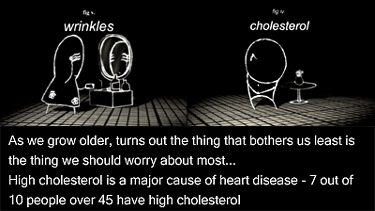Experts' plan to cut heart deaths
 Experts believe thousands of lives could be saved |
A radical new approach to preventing heart disease could save more than 7,000 lives over the next five years, according to health professionals. Experts are recommending a new approach which they say could also prevent 27,000 heart attacks and other "cardiac events" in Scotland.
About 500,000 more people could be in line to receive preventative treatment.
The plans, which recommend regular risk assessments for all over-40s, aim to target those most at risk.
They have been produced by the Scottish Intercollegiate Guidelines Network (Sign), which draws up guidelines for the NHS.
It recommends that more people should be given statin drugs to reduce cholesterol.
Lifestyle advice
The guidelines also recommend that, for the first time, doctors take into account social status when deciding whether people need treatment to prevent heart disease.
This could be based on the Scottish Index of Multiple Deprivation, which has been created by the Scottish Executive to identify areas of deprivation across Scotland.
It is expected that 50% of men in Scotland and 20% of women over the age of 40 could be prescribed cholesterol-lowering statins.
The guidelines would see the over-40s undergo a risk assessment every five years, at which they would also receive lifestyle advice.
The health professionals say that those at risk of less severe heart attacks should receive early heart X-rays and be assessed for possible surgery.
Patients with the most serious type of heart attack should be admitted to regional centres to have the blood clots and narrowed arteries removed and replaced with a device to keep the arteries open.
If this is not possible within 90 minutes of diagnosis, they should rapidly receive the most effective clot-busting drugs.
More patients with heart problems should be given implantable defibrillators to reduce the risk of sudden death and discharge arrangements for hospital patients with heart failure should be improved.
Professor Keith Fox of Sign said: "These guidelines bring together the most robust and up-to-date scientific evidence and the very best clinical expertise to detail how we can save thousands of people from developing and suffering the complications of heart disease.
"The result will be thousands of deaths avoided and tens of thousands of people whose lives will not be blighted by heart attacks, angina, heart failure, heart rhythm disorders and other complications that impair quality of life."
 More people will be screened for heart problems |
He said family history and social background could also be figured into risk assessment.
Coronary heart disease (CHD) claimed more than 10,000 lives in Scotland last year.
However, deaths have fallen by 30% over the last 10 years - partly because of previous Sign guidelines, according to the experts.
Marjory Burns, director of the British Heart Foundation Scotland, welcomed the new "milestone".
"These guidelines could save lives and improve the quality of life of people living with heart disease, but they will only do so if they are adequately resourced and implemented," she said.
"We would also therefore call on the Scottish Executive to ensure that the political will and the resources are found to implement them fully."
 | INTERACTIVE DEPRIVATION MAP
Many computers will open this web page automatically, but you may need Adobe SVG Viewer |
The chief executive of Chest, Heart and Stroke Scotland, David Clark, welcomed the new guidelines and reiterated the need for adequate funding.
He added: "We also need to keep up the message that the best ways to keep your heart healthy are to stop smoking, watch your diet and take more exercise."
It is estimated almost that 200 extra staff would be needed in the first five years of implementing the guidelines, with the total cost of putting the recommendations into practice estimated at £44m in the first year, rising to £78m in the sixth year.
A spokesman for the Scottish Executive said the guidelines set out a long-term vision for preventing and treating coronary heart disease.
"The recommendations in the guidelines about prevention sit well with our anticipatory care programme, Keep Well, which is about increasing the rate of health improvement in the most deprived communities," he added.
reposted from:
BBC my
highlights /
emphasis /
edits

















